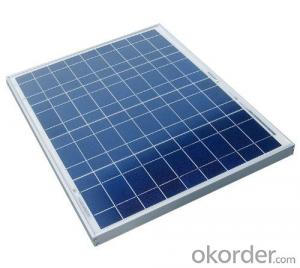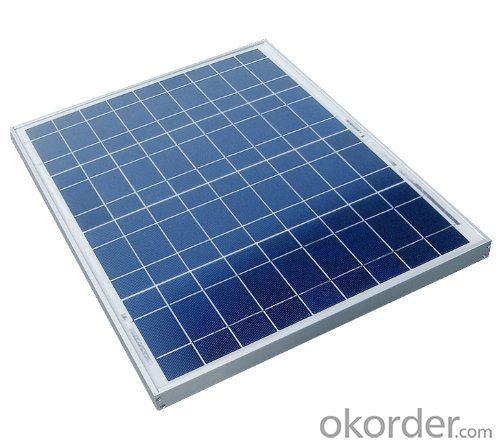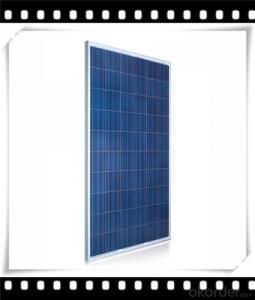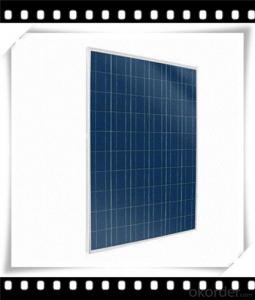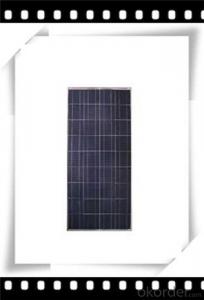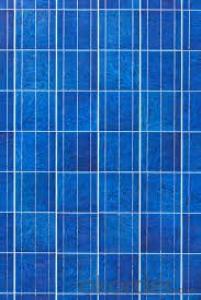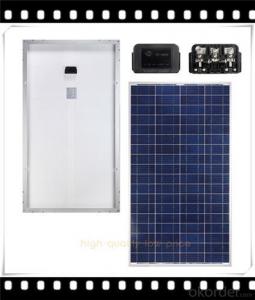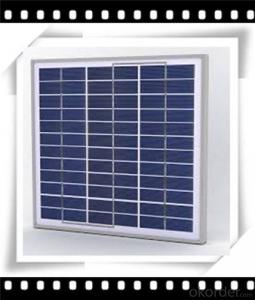Mage Solar Panels 4.5w Mini Poly Solar Panel CNBM
- Loading Port:
- Qingdao
- Payment Terms:
- TT OR LC
- Min Order Qty:
- 10 set
- Supply Capability:
- 300000 set/month
OKorder Service Pledge
OKorder Financial Service
You Might Also Like
Polycrystalline Solar Modules
CNBM offers a range of small, medium and large polycrystalline solar modules, designed for a range of requirements.
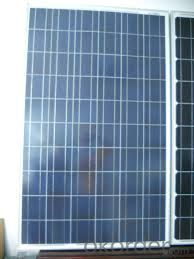
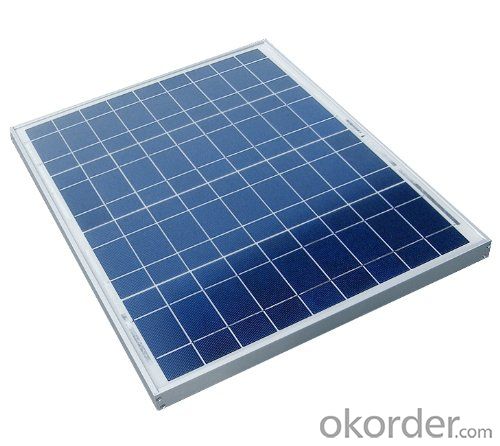
Specifications:
Tolerance | +/-3% |
Cell | Polycrystalline silicon solar cells (156 x 156mm) |
N0. of Cells | 60 (10 x 6) |
Dimension of Modules (mm) | 1650 x 990 x 40 |
Weight (kg) | 25.5 |
Limits:
Operating Temperature | -40~+85? |
Storage Temperature | -40~+85? |
Maximum System Voltage | 1000 VDC max. |
Hail Impact | Diameter of 28mm with impact speed |
Temperature and Coefficients:
NOCT | 48C+/-2? |
Voltage temperature coefficient (%/K) | -0.35 |
Current temperature coefficient (%/K) | 0.05 |
Power temperature coefficient (%/K) | -0.45 |
Characteristics:
Model: | SGM-200P | SGM-210P | SGM-220P |
Max-power voltage Vmp (V) | 29.2 | 29.4 | 29.41 |
Max-power current Imp (A) | 6.85 | 7.14 | 7.48 |
Open-circuit voltage Voc (V) | 36.5 | 36.69 | 36.9 |
Short-Circuit Current Isc (A) | 7.28 | 7.6 | 7.93 |
Max-power Pm(W) | 200 | 210 | 220 |
Model: | SGM-230P |
Max-power voltage Vmp (V) | 29.8 |
Max-power current Imp (A) | 7.72 |
Open-circuit voltage Voc (V) | 37.31 |
Short-Circuit Current Isc (A) | 8.19 |
Max-power Pm(W) | 230 |
STC: Irradiance 1000W/m2, module temperature 25?, AM-=1.5
Poly Crystalline Solar Panels Specifications Range
Maximum Power (Pm) | Dimension | Weight | Operating Voltage (Vmp) | Operating Current (Imp) | Open Circuit Voltage (Voc) | Short Circuit Current (Isc) |
0.45W | 140x80x10mm | 0.08kg | 3.3V | 150mA | 4.6V | 160mA |
1.0W | 162x140x10mm | 0.16kg | 7.5V | 150mA | 10.3V | 160mA |
4.5W | 269x251x23mm | 0.8kg | 16.5V | 0.27A | 20.5V | 0.3A |
10W | 420.1×268.9×22.6mm | 1.92kg | 17.5V | 0.58A | 20.5V | 0.6A |
20W | 425x502x50mm | 3.0kg | 16.8V | 1.19A | 21.0V | 1.29A |
30W | 593x502x22.6mm | 3.9kg | 16.8V | 1.78A | 21.0V | 1.94A |
40W | 655x537x50mm | 5.75kg | 17.3V | 2.31A | 22.1V | 2.54A |
50W | 839x537x50mm | 6.0kg | 17.5V | 2.9A | 21.8V | 3.17A |
65W | 1111x502x50mm | 7.2kg | 17.6V | 3.69A | 22.1V | 3.99A |
80W | 1204x537x50mm | 7.7kg | 17.6V | 4.55A | 22.1V | 4.8A |
- Q: Can solar panels be used to power a hotel?
- Yes, solar panels can be used to power a hotel. Solar panels convert sunlight into electricity, which can be used to meet the energy needs of a hotel. By installing a sufficient number of solar panels, a hotel can generate enough power to run its various systems, including lighting, heating, cooling, and other electrical appliances. This not only helps reduce the hotel's reliance on traditional power sources but also lowers operating costs and promotes sustainable energy practices.
- Q: Can solar panels be installed on a golf course or clubhouse?
- Yes, solar panels can be installed on a golf course or clubhouse. The large open spaces and ample sunlight make it an ideal location for harnessing solar energy. Installing solar panels can help generate clean and sustainable electricity, reducing reliance on traditional power sources and potentially lowering energy costs for the golf course or clubhouse.
- Q: I think that solar panels are the future and i think that the conventional way of generating electricity is going to be replaced by solar panels. I would like to be part of this industry as an entrepreneur but i do not know how to since i do not have a technical background. I would like to sell solar panels to consumers and to business. Should I start a manufacturing company that manufactures solar panels? Should I buy solar panels from manufactures and sell them to consumers? What should I do?
- actually, i think of it rather is an extremely lifelike purpose for recuperating air high quality and suplying skill. you will not go with to apply it as a highway floor, as deposits from tire treads might degrade its productiveness, yet one among those equipment could actually be built alongside roadways and rail structures. Panels would not could be as extensive as a roadway, as you have practically countless linear area. besides the undeniable fact that, i don't think of it will make a distinction in worldwide climate replace. the time-honored utilising tension for worldwide warming isn't guy-made polution, yet organic phenomena which contain volcanic eruptions. human beings in all probability have some effect, yet its slightly like the entire tea-cup-in-the-swimming-pool difficulty. there is not something that could be executed approximately worldwide warming. keep in mind that the earth's climate is in a relentless cycle from chilly to warm, and back to chilly. i'm confident you have heard of ice a protracted time.
- Q: ok im going off grid and will have my fridge and stove running on propane but im trying to figure out that at night i want to be able to run my 32 inch lcd tv a internet modem a playstation 3 and 2 laptops and a light or 2 and maybe a floor fan through solar power and i would like to be able run my tv and stuff up to 8 hours in to the night and so i just want to know how many batterys and solar panels i need or how many watts system do i need im running all this on one outlet now at home so i know its under 20 amps and i think i use about 000 watts an hour im not sure so thats why im asking i really need help with this i hope i dont need a $5,000 system thats crazy im only wanting to spend like a $000 please dont explain math figures or a bunch of complicated garbage to me i just want a straight answer on what i need to do to be able to do this thank you!
- There okorder / Why pay thousands of dollars for solar energy ($27,000 average cost) when you can build your own solar panel system for just a fraction of the retail cost. You can build a single solar panel or you can build an entire array of panels to power your whole house. Some people are saving 50% on their power bill, some people are reducing their bill to nothing. But what’s most impressive is that just by following these instructions some are even making the power company pay them!
- Q: i hav e a project for school we need to calculate cost to buy and install solar panels in our school
- to okorder / you should really be able make report with this informatin. So for your school it would cost millions, you need to figure out how many kilowatts your school use, then use the information above to calculate how large of system would be required you will be very impressive and the most informed person in your school.
- Q: We have LED at the output of 40 watts and is used for 0 hours giving us 400 Watts-hr of energy consumed.Rechargable batteries needed are 2 V. 400/2 gives us 34 Ampere-hour battery needed. If we want it for 3 days, It would be 34x3=00 Ah. So the battery needed 00 AhNow how do I select the solar panel which can charge this/these batteries? What should be its rating?
- Be aware that you cannot discharge the full capacity of a lead-acid battery without destroying the battery. With a normal battery of this type, you would only want to discharge about 20%, so you would need a 70 AH battery bank. For the 3-day requirement, 500 AH. This is still within reason. If you didn't have the 3-day requirement, you might consider going with NiMH batteries. Back to the 500 AH bank, you would usually charge at at least 5% C, or 25 amps. At the 5 volts that you need for charging, this is 375 watts. Possibly you could go as low as 200 watts.
- Q: Can solar panels be used to power a shopping mall?
- Yes, solar panels can be used to power a shopping mall. By installing a sufficient number of solar panels on the mall's roof or in nearby open spaces, it is possible to generate enough electricity to meet a significant portion of the mall's energy needs. This can help reduce the mall's reliance on traditional energy sources, lower its carbon footprint, and potentially save on long-term energy costs.
- Q: I want to also know if the 0 watt rating on the solar panel is 0 watts per day or is it constantly adding 0 watts? Is there a time which the 0 watts is being added like 0 watts per second or 0 watts per minute and so on?
- What is the open circuit voltage and voltage under load with the panel in full sun? Assuming it is typical of many 0W panels, the open circuit voltage is 2V and the voltage under load is about 7V. 0W/7V is 588mA. A typical car battery is 40 Amp Hours. Amp Hours, or Ah, is the capacity of the battery. How much current a battery can delivery starting a car is called cold cranking amps. A deep cycle marine battery will typically be more than 40Ah. A 40Ah car battery at 50% charge will more than likely start your car in fair weather. Cold weather is another story. So, to get a completely dead car battery to 50% - 20Ah - would be maybe two days of full sunlight - with only a 50% charge, or about 2.2 Volts. Not a great battery charger - however - It makes a great supplement, and can offset the use of DC powered equipment in the vehicle while the engine is off. Things like low-wattage lights, cell phone chargers, tablets, and the like will drain the battery down that much slower. I have a number of powered but low current items on in my truck all the time. A panel helps offset some of that drain if I don't drive for a few days.
- Q: I can't figure out how to charge a Ni Cd (BD 8V Firestorm) battery directly with a solar panel so I've come up with an alternative which might or might not work. I thought I would connect an inverter (I found a nice 400W for $30) to my trucks battery and plug the BD Firestorm battery charger into the inverter. Then I was thinking I could use a 5W solar panel to trickle charge the truck battery and keep it connected after the Ni Cd is charged to ensure the truck battery is topped off. The truck would not be running during this process. Will this solution work? Is there a better solution?
- image voltaic charger employs image voltaic ability to offer electricity to units or cost batteries. they're oftentimes portable. image voltaic array: electric powered gadget alongside with an excellent array of related image voltaic cells image voltaic Panel is a crew of image voltaic cells arranged right into a panel which would be put in onto a flat floor. The panel captures image voltaic and converts it into DC ability.
- Q: How do solar panels affect the aesthetics of a roof?
- Solar panels can have both positive and negative effects on the aesthetics of a roof. While some people may view them as an eyesore, advancements in technology have led to sleeker and more attractive designs. Additionally, the environmental benefits and cost savings associated with solar panels often outweigh any perceived negative impact on the overall appearance of a roof.
Send your message to us
Mage Solar Panels 4.5w Mini Poly Solar Panel CNBM
- Loading Port:
- Qingdao
- Payment Terms:
- TT OR LC
- Min Order Qty:
- 10 set
- Supply Capability:
- 300000 set/month
OKorder Service Pledge
OKorder Financial Service
Similar products
Hot products
Hot Searches
Related keywords
